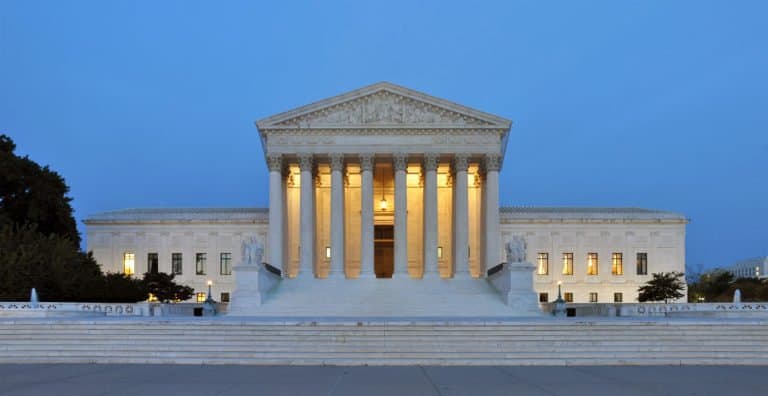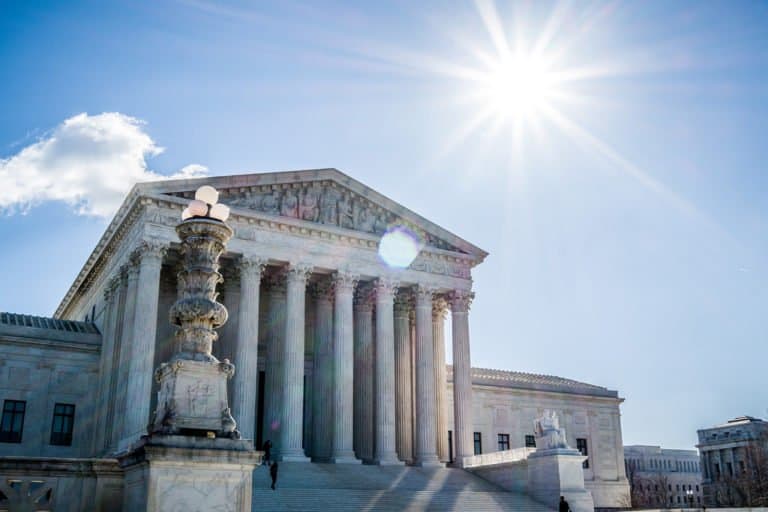Maddy Joseph is a student at Harvard Law School.
Here’s a very quick summary based on an even quicker read of the Court’s Janus opinion which overrules Abood and holds that agency fees violate the First Amendment.
The majority opinion by Justice Alito starts by reasoning that Abood was inconsistent “with standard First Amendment principles.” Here, the Court builds on its reasoning in Knox and Harris (which Justice Kagan’s dissent twice identifies as key to the Court’s “6-year campaign to reverse Abood”). Requiring government workers to pay agency fees amounts to compelling government workers to speak and allowing the government to compel speech is generally anathema to the First Amendment, the majority reasons. The Court declines to hold that strict scrutiny applies to arrangements like agency fees, but implies, as it did in Harris that the “exacting” scrutiny that does apply, might not be sufficiently protective.
Regardless of whether “exacting” or “strict” scrutiny applies, the majority continues, Abood’s justifications for agency fees fail. Rejecting the “labor peace” rationale, Justice Alito emphasizes that “the pandemonium [Abood] imagined would result if agency fees were not allowed” has not come to pass, pointing to the “federal employment experience”—where agency fees are not allowed—as the prime example. Turning next to the free rider justification, the Court says this: “In simple terms, the First Amendment does not permit the government to compel a person to pay for another party’s speech just because the government thinks that the speech furthers the interests of the person who does not want to pay.” And it disputes that it is “unfair” to require unions to fairly represent nonmembers without requiring nonmembers to contribute — the supposed “benefits” of exclusive representation status for unions are sufficient. In addition, the Court noted that unions could deny certain services, such as representation in grievances, to nonmembers or charge a fee for those services.
Justice Kagan’s dissent argues that the majority here misses the point. The point is not simply that it is unfair to require unions to represent nonmembers or that unions will be unwilling to become exclusive representatives without agency fee agreements but that unions will not “be able to . . . carry on as an effective exclusive representative.” Elsewhere, the majority dismisses the idea that unions will not be able to survive without agency fees. At one point, the Court writes: “We recognize that the loss of payments from nonmembers may cause unions to experience unpleasant transition costs in the short term, and may require unions to make adjustments in order to attract and retain members. But we must weigh these disadvantages against the considerable windfall that unions have received under Abood for the past 41 years.” This view, the dissent argues, defies “basic economic theory”: the longstanding view that rational employees will free ride once they “(including those who love the union) realize that they can get the same benefits even if they let their memberships expire.”
The majority and the dissent also battle over Abood’s place in the Court’s cases about the government as employer, cases like Pickering. Pointing out that Abood did not rely on Pickering, the majority says that the framework in those cases—which allows the government wide latitude to regulate speech by employees on matters of workplace concern but less latitude to regulate speech on matters of public concern —doesn’t fit here, as it is designed to evaluate situations in which a single employee is fired for speaking out. And even if the framework did apply, Justice Alito says, agency fees would still be unconstitutional. Here, the majority casts public sector union work as public, noting mostly that unions “affect[] how public money is spent.” In dissent, Justice Kagan points out that this broad definition of speech on matters of public concern “expos[es] government entities across the country to increased First Amendment litigation and liability,” but predicts that perhaps “when actual cases of this kind come around, we will discover that today’s majority has crafted a ‘unions only’ carve-out to our employee-speech law.” This point is consistent with the dissent’s broader argument about the Pickering line of cases. It’s not that Pickering’s framework literally applies here, Justice Kagan argues, it’s that Abood “fit neatly” with other First Amendment cases like Pickering that “have granted substantial latitude to the government, in recognition of its significant interests in managing its workforce so as to best serve the public.”
Stare decisis is the last big issue. Consistent with the Harris Court’s hints on this score, the majority has this to say: the “quality” of Abood’s reasoning was flawed; its rule has proven “unworkable”; Abood is inconsistent with other decisions; the reliance Abood engendered is not significant enough; there have been new “developments” since Abood. On this last point, the Court argues that public sector unions have become more politicized since the 1970s, blaming collective bargaining and the “mounting costs” of public workforces for “unsustainable” state spending and “municipal bankruptcies.” The dissent takes emphatic issue with the idea that Abood hasn’t engendered reliance. “[J]udicial disruption,” Justice Kagan writes, “does not get any greater than what the Court does today.”
Finally, the Court may seem to suggest that the First Amendment requires employees to actively opt in to agency fee payments. Janus and amici had asked for such a requirement. The Court writes: “Neither an agency fee nor any other payment to the union may be deducted from a nonmember’s wages, nor may any other attempt be made to collect such a payment, unless the employee affirmatively consents to pay.”








Daily News & Commentary
Start your day with our roundup of the latest labor developments. See all
February 24
In today’s news and commentary, the NLRB uses the Obama-era Browning-Ferris standard, a fired National Park ranger sues the Department of Interior and the National Park Service, the NLRB closes out Amazon’s labor dispute on Staten Island, and OIRA signals changes to the Biden-era independent contractor rule. The NLRB ruled that Browning-Ferris Industries jointly employed […]
February 23
In today’s news and commentary, the Trump administration proposes a rule limiting employment authorization for asylum seekers and Matt Bruenig introduces a new LLM tool analyzing employer rules under Stericycle. Law360 reports that the Trump administration proposed a rule on Friday that would change the employment authorization process for asylum seekers. Under the proposed rule, […]
February 22
A petition for certiorari in Bivens v. Zep, New York nurses end their historic six-week-strike, and Professor Block argues for just cause protections in New York City.
February 20
An analysis of the Board's decisions since regaining a quorum; 5th Circuit dissent criticizes Wright Line, Thryv.
February 19
Union membership increases slightly; Washington farmworker bill fails to make it out of committee; and unions in Argentina are on strike protesting President Milei’s labor reform bill.
February 18
A ruling against forced labor in CO prisons; business coalition lacks standing to challenge captive audience ban; labor unions to participate in rent strike in MN